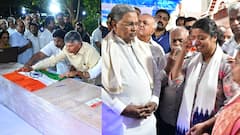Retired SC Judge, Part Of Constitution Bench In Ayodhya Case, Appointed Andhra Guv — All About Him
Retired Supreme Court judge Nazeer was appointed governor of Andhra Pradesh while the current Andhra Pradesh governor Biswa Bhusan Harichandan has been appointed as the governor of Chhattisgarh

Former Supreme Court judge S Abdul Nazeer, who was part of the Constitution bench that upheld the archaeological report on Ayodhya, will be the new governor of Andhra Pradesh as President Droupadi Murmu on Sunday appointed 13 new Governors to States and Union Territories.
Retired Supreme Court judge Nazeer was appointed governor of Andhra Pradesh while the current Andhra Pradesh governor Biswa Bhusan Harichandan has been appointed as the governor of Chhattisgarh.
Justice (Retd.) S Abdul Nazeer appointed as Governor of Andhra Pradesh. Governor of Andhra Pradesh Biswa Bhusan Harichandan appointed as Governor of Chhattisgarh. Governor of Chhattisgarh Anusuiya Uikye appointed as Governor of Manipur.
— ANI (@ANI) February 12, 2023
Also read | Chittoor: TDP Workers Clash With Police In Nara Lokesh’s ‘Yuva Galam Yatra’
Justice Nazeer, who retired on January 4, has been part of several path-breaking verdicts, including those on the politically sensitive Ayodhya land dispute, instant 'triple talaq' and the one that declared 'right to privacy' a fundamental right.
Justice Nazeer enrolled as an advocate and started practicing in 1983 in Karnataka High Court. He was appointed as an additional judge in 2003 following which in the next year he became a permanent judge in the Karnataka High Court.
Elevated as an apex court judge on February 17, 2017, Justice Nazeer was part of several Constitution benches which delivered judgments on issues ranging from the demonetisation of currency notes of Rs 1,000 and Rs 500 denominations in 2016 to the reservation for Marathas in admission and government jobs and the fundamental right of freedom of speech and expression of high public functionaries.
He was part of a five-judge Constitution bench which had in November 2019 cleared the way for the construction of a Ram Temple at the disputed site at Ayodhya and directed the Centre to allot a five-acre plot to the Sunni Waqf Board for a mosque.
The Justice Nazeer-led five-judge Constitution benches delivered two separate verdicts this year, including the one which by a majority of 4:1 validated the legality of the Centre's 2016 decision to demonetise the Rs 1,000 and Rs 500 denomination currency notes, saying the decision-making process was neither flawed nor hasty.
(With PTI inputs)
Related Video
Violation of Covid protocols in Telangana election rally





































